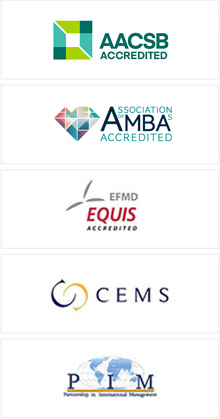Doctor’s career path: Postdoctoral Researcher Eeva Houtbeckers’ story
People are best about doctoral studies, because learning happens in different communities.
 Eeva Houtbeckers, you graduated with a master’s degree in economics in 2008. Was it obvious for you that you wanted to pursue doctoral studies in business and economics?
Eeva Houtbeckers, you graduated with a master’s degree in economics in 2008. Was it obvious for you that you wanted to pursue doctoral studies in business and economics?
Starting doctoral studies was not self-evident for me. When considering my career options I realised I wanted to develop my expertise concerning business in society. While attending a few public lectures given by researchers I understood that working as a researcher would enable me to focus on the themes I found interesting.
I managed to book a meeting with the head of the research group focusing on corporate environmental and social responsibility in the Helsinki School of Economics (today Sustainability in Business Research Group in Aalto University). I was hired to work in two TEKES projects in 2009 and I gradually started to attend doctoral courses before my official admission in 2010.
What do you think is best about the doctoral studies at the School of Business?
People! Learning is not an individualistic process but we co-construct knowledge and learn in different communities. I have been lucky to have the possibility to work with smart and pleasant researchers, teachers and staff in the School of Business, in the Aalto University in general, and elsewhere.
The School of Business doctoral programme has become much more international in the past years. During your studies, how much did you take part in seminars and conferences abroad?
It felt natural to me from the very beginning of my doctoral studies to attend national and international seminars and conferences. Before the doctoral studies I had worked as an international officer in a national student organization and had got used to participate in seminars. To my surprise international student seminars were far more stressful than any of the research related events before. I still enjoy international gatherings, since meeting new and familiar colleagues is inspiring. In the end, research is about written and real time conversations.
Did you conduct studies in foreign universities during your doctoral studies? If so, did you apply for funding from a foundation for this purpose?
As there were no courses about social entrepreneurship, I took part in thematic summer schools and conference with doctoral studies workshops. In addition, I spent six months as a visiting researcher in Roskilde University, Denmark, since it hosts the Centre for Social Entrepreneurship.
I applied external funding for most of the travels, which requires sound argumentation for the funders. Also in this perspective I have been lucky since I have always been able to attend the meetings I have been accepted to join.
How long did your doctoral studies take?
I did my doctoral studies in six years during 2010‒2016, I spent one year on parental leave during the years. In practice I took doctoral level courses as a project researcher already in 2009.
Did you find employment after your doctoral studies in the way that you had hoped?
Yes. I started as a postdoctoral researcher two months after my public doctoral defence. I was awarded with personal funding from Nessling Foundation and Kone Foundation to conduct research during 2017‒2020. I study social entrepreneurship for post-growth societies in the global North. My aim is to use video ethnography to explore activities related to gaining a livelihood when aiming for an ecologically and socially just world in the global North, Finland in particular. For more information about my project, please take a look at aatteinen.wordpress.com
Read more about the School of Business doctoral programme



